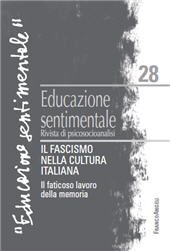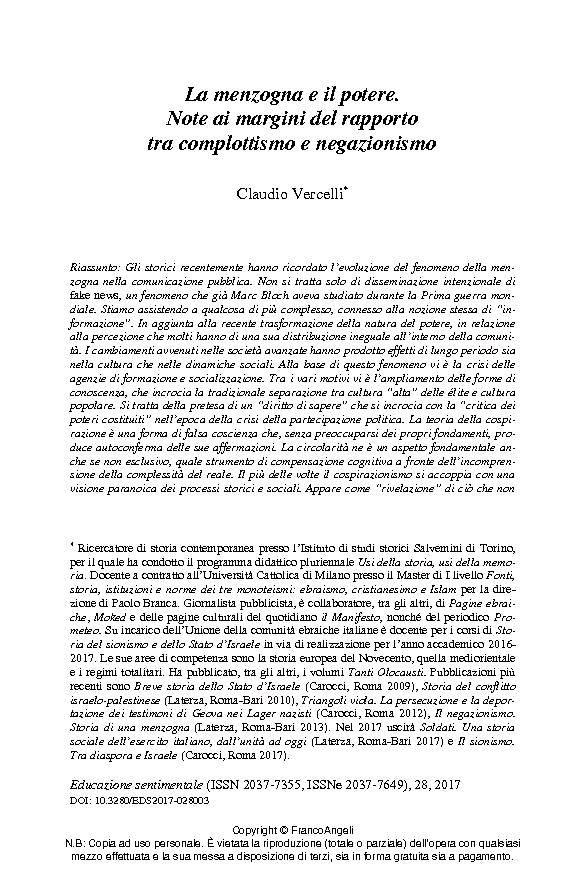La menzogna e il potere : note ai margini del rapporto tra complottismo e negazionismo
13-33 p.
Gli storici recentemente hanno ricordato l'evoluzione del fenomeno della menzogna nella comunicazione pubblica. Non si tratta solo di disseminazione intenzionale di fake news, un fenomeno che già Marc Bloch aveva studiato durante la Prima guerra mondiale. Stiamo assistendo a qualcosa di più complesso, connesso alla nozione stessa di "informazione". In aggiunta alla recente trasformazione della natura del potere, in relazione alla percezione che molti hanno di una sua distribuzione ineguale all'interno della comunità. I cambiamenti avvenuti nelle società avanzate hanno prodotto effetti di lungo periodo sia nella cultura che nelle dinamiche sociali. Alla base di questo fenomeno vi è la crisi delle agenzie di formazione e socializzazione.
Tra i vari motivi vi è l'ampliamento delle forme di conoscenza, che incrocia la tradizionale separazione tra cultura "alta" delle élite e cultura popolare. Si tratta della pretesa di un "diritto di sapere" che si incrocia con la "critica dei poteri costituiti" nell'epoca della crisi della partecipazione politica. La teoria della cospirazione è una forma di falsa coscienza che, senza preoccuparsi dei propri fondamenti, produce autoconferma delle sue affermazioni. La circolarità ne è un aspetto fondamentale anche se non esclusivo, quale strumento di compensazione cognitiva a fronte dell'incomprensione della complessità del reale. Il più delle volte il cospirazionismo si accoppia con una visione paranoica dei processi storici e sociali. Appare come "rivelazione" di ciò che non può essere detto, assumendo i caratteri di un discorso critico nei confronti dell'ordine costituito. [Testo dell'editore].
Historians, as well as many scholars or researchers of human sciences, have in recent years recorded the evolution of the phenomenon of lies in the field of public communications. It is not only the deliberate dissemination of fake news - a phenomenon that Marc Bloch had al-ready investigated in its many implications during the First World War. We are looking at something more complex and composite, linked to the very change of the notion of "infor-mation" from the time of its establishment to the taking and the public's enjoyment. In addition to the transformation of the nature of power in the contemporary era, in relation to the perception of many, especially in its unequal distribution among the community. Changes in advanced development societies in these decades have produced long-term effects both in cultural and social dynamics. The background to this phenomenon is the crisis of sources and training agencies.
Among other things, it is derived the spread of heterogeneous forms of knowledge, transversely to the old separation between "high" culture, elite and popular culture. This is essentially the product of the pretense of a "right to know" that intersects with the "criticism of the constituted powers" in the era of the crisis of political participation. Strategic is the development of a true "info-sphere", a circuit not only of instrumental goods for communication, but of virtual relationship sites where they generate, contract and transform images, symbols meanings. Collective history is increasingly confronted with this ubiquitous platform, where it wins mass narcissism. The theory of the conspiracy is a form of false conscience which, regardless of the integrity of its origins, produces a self-validation of its affirmations. Circularity is a fundamental but not exclusive aspect, constituting a means of cognitive compensation in front of the misunderstanding of the complexity of reality.
Often, the plot theory meets and is married with paranoid visions of historical and social processes. It always seems to be a "revelation" of the unspeakable, assuming the characters of a critical discourse on the established order. The investigation of some empirical bonds related to this evolution of the perception of reality implies questioning the plausibility of establishing a form of "alter-cognition" based not so much on the possibility of a concrete project of change of society as to the systemic spread of negative idealizations, storage of impotence and rancor. Last but not least, it calls the historian in the survey of changes in the statute that his discipline is aware of in the face of this profound reconfiguration of the question of understanding the present moment. [Publishers' text].
Forma parte de
Educazione sentimentale : 28, 2, 2017-
Artículos del mismo número (disponibles individualmente)
-
Información
Código DOI: 10.3280/EDS2017-028003
ISSN: 2037-7649
MATERIAS
KEYWORDS
- Negazionismo, cospirazionismo, complottismo, potere, antisemitismo, paranoia, informazione, menzogna
- Denial of history, theory of the conspiracy, plot theory, power, anti-Semitism, paranoia, information, lie.



